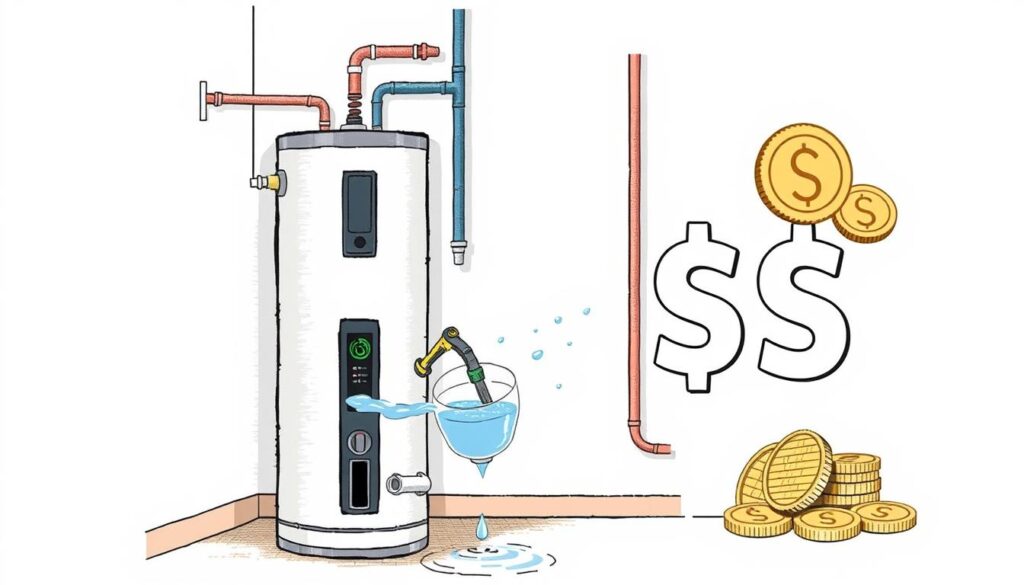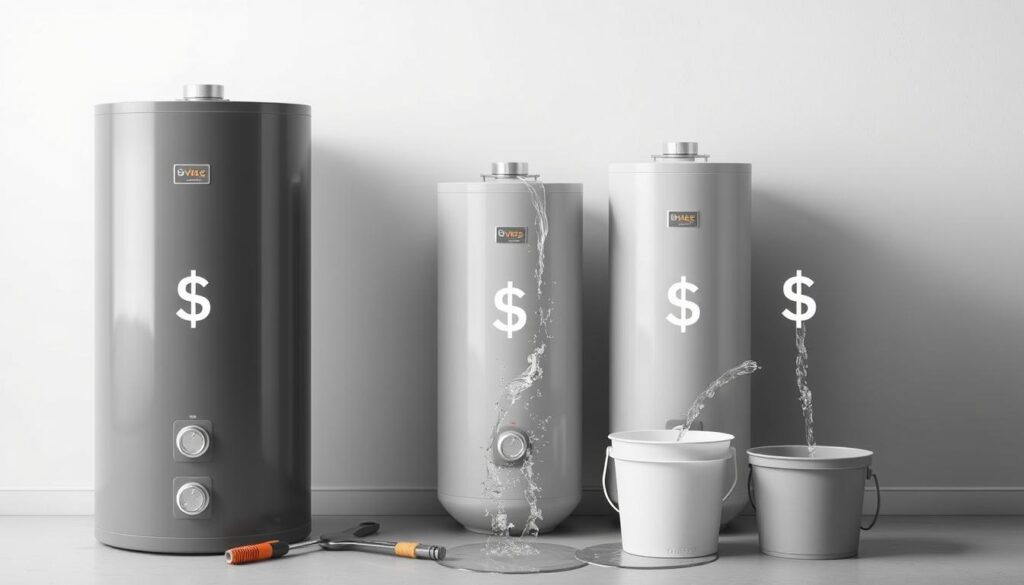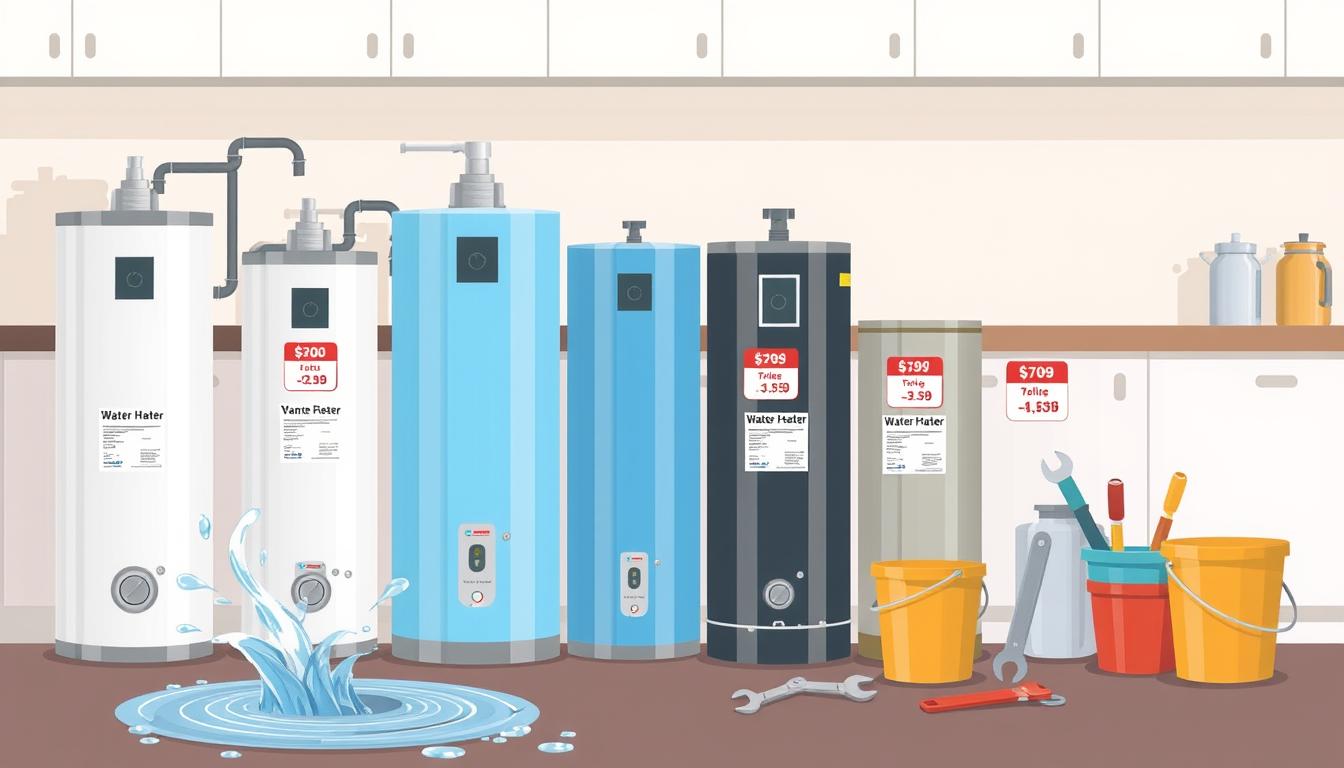Knowing the drain water heater cost is key for homeowners. It helps keep water heaters working well and lasting longer. We’ll explore the water heater draining cost, including average prices and tips to save money.
Draining costs range from $75 to $150 for standard heaters and $150 to $350 for tankless ones. Knowing this can help you save money1. The type, size, and where your heater is located all affect the cost. Also, choosing to do it yourself or hiring a pro can change your expenses a lot. This guide aims to help you understand these costs better, so you can make smart choices about your water heater.
Key Takeaways
- Regular draining reduces sediment build-up and improves efficiency.
- The cost to drain standard water heaters varies between $75 and $150.
- Tankless water heaters have higher draining costs, typically $150 to $350.
- Factors influencing costs include type, size, and location of the water heater.
- Dedicating time to maintenance can prevent costly repairs or replacements.
- Consider DIY drainage for small costs while knowing your limits.
- Request multiple quotes from plumbers to find the best service.
Introduction to Water Heater Draining
Draining your water heater is key to keeping it running well for years. It removes sediment that can hurt its performance and cause expensive fixes. Doing this regularly can make your heater more efficient and last longer.
Draining a water heater usually takes an hour. How often you should do it depends on your water quality and the heater’s age. It’s best to drain it once a year, and twice if you have hard water2.
After draining, it takes some time for the heater to heat up again. A 50-gallon heater might take 30 to 60 minutes, while an 80-gallon one could need almost two hours2.
Using the right tools is important for draining your water heater. You’ll need an adjustable wrench, a garden hose, and a flat-head screwdriver. Regular maintenance keeps your heater working well and saves you money in the long run.
Draining your water heater is more than just a routine task. It’s a way to keep your system running at its best. By doing this, you avoid problems and make your water heating system more efficient3.
Understanding the Importance of Draining Your Water Heater
Draining your water heater is very important. It helps extend the life of your hot water tank. It also prevents harmful sediment and mineral buildup that can damage it over time4.
Not draining it regularly can cause overheating and damage. It can also lead to safety hazards, poor water quality, and bacteria growth4.
Draining the tank makes it more energy-efficient. It removes sediment, which reduces the water heater’s workload4. This means you use less energy and save on utility bills4.
It’s best to drain your water heater every six months to a year. This is especially true in areas with lots of minerals5. Signs it needs draining include bad smells from hot water and rust-colored water5.
Regular maintenance boosts performance and keeps water quality good4. Draining it can add three to five years to its life5. It helps avoid sediment and other problems like reduced water flow and inefficient heating4.
By regularly draining your water heater, you ensure it works well. You also protect its long-term health.
How Much Does It Cost to Drain a Water Heater
Knowing the cost to drain your water heater is key for homeowners. Prices change based on the water heater type. This knowledge helps with budgeting and keeping your appliance in top shape.
Average Costs for Standard Water Heaters
The cost to drain a standard water heater is usually between $75 and $150. This price includes labor and materials for the flush. Professional services can vary based on location and rates.
Average Costs for Tankless Water Heaters
Tankless water heaters cost more to drain. Prices range from $100 to $300 for a pro service. DIY options are also available, costing between $30 and $100 for the needed kits67.

| Water Heater Type | Average Professional Cost | DIY Cost Range |
|---|---|---|
| Standard | $75 – $150 | N/A |
| Tankless | $100 – $300 | $30 – $100 |
These prices show why it’s important to know the cost of draining a water heater. This knowledge helps plan for services or DIY options6.
Pricing for Water Heater Draining: Factors to Consider
When looking at the cost of draining a water heater, several factors impacting water heater cost are important. Knowing these helps homeowners plan their expenses better.
Water Heater Type and Its Impact on Costs
The type of water heater greatly affects the cost. Tank-style heaters cost between $600 to $2,500 to replace. Tankless units, however, can cost between $1,200 to $3,5008. These prices can also affect the draining cost, especially for tankless models with their complex setup.
Size of the Tank: How It Affects the Cost
A bigger tank means higher draining costs. Flushing out a larger tank takes more time, raising labor costs. Labor costs can range from $50 to $150 an hour. Since labor is about 50 percent of the replacement budget8, it can significantly increase your total cost.
Location and Accessibility
The water heater’s location can also impact the draining cost. If it’s easy to reach, costs stay low. But, if it’s hard to get to, more time and labor are needed, raising the price. Homeowners should think about these factors when planning for water heater upkeep.
Water Heater Draining Cost: DIY vs. Professional Services
Homeowners often face a choice between DIY and professional water heater draining. Knowing the costs of each option is key to making a smart decision.
Cost Breakdown for DIY Water Heater Draining
DIY water heater draining is a cost-effective choice. It only needs basic supplies, costing between $10 to $20. This makes it a good option for those who like to fix things themselves. Yet, DIY plumbing can lead to more problems and costs if not done right.
Professional Water Heater Draining Cost Estimates
On the other hand, hiring a professional for water heater draining costs more but offers peace of mind. The price can range from $75 to $150, based on location and service complexity. While it might seem expensive at first, professional services are safer and more effective. This is especially true to avoid serious plumbing issues from DIY mistakes.
Average Cost to Drain Water Heater by Tank Size
When looking at the cost to drain a water heater, tank size matters a lot. Knowing water heater size costs helps homeowners make better choices.
Costs for 30-40 Gallon Tanks
Draining a 30-40 gallon water heater usually costs between $75 and $120. This price covers the usual steps and the time a technician needs to do the job well.
Costs for 50-80 Gallon Tanks
Draining a 50-80 gallon tank costs more, from $180 to $250 or more. This is because draining bigger tanks takes more time and effort. This adds to the average cost to drain water heater by tank size1.

Common Reasons for Water Heater Draining
Draining your water heater regularly is key to keeping it running well. Homeowners need to know why this is important. It’s about getting rid of sediment and making the heater more energy-efficient. If you ignore these needs, your heater might start to have problems.
Removing Sediment Build-Up
Sediment build-up is a big reason to drain your water heater. It comes from minerals in the water, especially in areas with hard water. This sediment makes the heater less efficient, leading to lukewarm water and higher energy bills. By removing sediment, you can make your heater work better and last longer. It’s recommended to drain your water heater at least once a year for safety and efficiency9.
Improving Energy Efficiency
Draining your water heater also helps with energy efficiency. Sediment at the bottom of the tank makes it harder for the heater to warm the water. By getting rid of this sediment, you can save on energy costs and lower your utility bills. Your water heater should be able to provide at least 75% hot water to be efficient. Regular maintenance is crucial for this10.
Water Heater Maintenance Cost: Regular Draining
Draining your water heater regularly is key to keeping it running well and avoiding costly fixes. Experts suggest doing this at least once a year to stop sediment buildup. This buildup can cut down on performance and hot water11. The cost for a pro to do this usually falls between $80 and $100 a year12.
This step can save you money on energy bills and repairs later on. It’s a smart move for any homeowner.
Draining the water heater takes some time, but checking the water for sediment is crucial11. If the water is still cloudy, you might need to drain it again until it’s clear11. Regular upkeep is vital for your water heater’s long life and best performance.
Also, parts like a drain valve can cost as little as $812. While this might seem like a small expense, the benefits of regular maintenance far outweigh it. In the long run, these maintenance costs are a small price to pay for a well-functioning water heater.
Recommendations for Water Heater Maintenance
Keeping your water heater in good shape is key to its long life and efficiency. Homeowners should follow important maintenance tips to avoid expensive fixes and keep it running well. Draining the unit once or twice a year removes sediment, saving energy and money1314. Also, checking the anode rod regularly helps prevent corrosion and extends your water heater’s life14.
Managing the temperature is another crucial step. Setting it between 120 to 130 degrees Fahrenheit cuts down on energy use and wear14. Insulating hot water pipes also helps keep the water warm, saving energy1314. Simple habits like shorter showers and using cold water for laundry also help13.
Getting maintenance done during the off-season can save you money. Scheduling visits when it’s less busy often means better prices and more focused service. By following these maintenance tips, you can make your water heater last longer and save on costs, especially if you upgrade to a more efficient model13.
Budgeting for Water Heater Draining and Maintenance
Effective budgeting for water heater draining means knowing the costs of DIY and professional services. Understanding maintenance cost planning helps avoid surprise bills. Routine plumbing visits usually cost between $100 and $250, not including repairs or replacements15.
Emergency plumbing services can cost between $100 and $500 an hour16. Plumbers in cities might charge $75 to $250 an hour. Water heater repairs start at $35016 and17. It’s smart to have a budget for budgeting for water heater draining to avoid financial stress during emergencies.
Plumbing repair costs vary a lot; they can be from $150 to $50017. Combining repairs in one visit can save on labor costs. Regular plumbing checks, every 1-2 years, can save a lot of money16.
Here’s a summary table of potential costs related to water heater services:
| Service Type | Cost Range |
|---|---|
| Routine Maintenance Visit | $100 – $250 |
| Emergency Plumbing Service | $100 – $500 per hour |
| Water Heater Repair | Starting at $350 |
| Common Plumbing Repairs | $150 – $500 |
| Full House Repiping | $10,000 – $20,000 |
By planning for maintenance cost planning and tracking costs, homeowners can manage their plumbing budget better. This helps avoid unexpected expenses.
Finding the Right Professional for Water Heater Draining
Choosing the right plumber for water heater draining is key for a smooth service. Homeowners should look for plumbers who offer good prices and know how to work with different water heaters. Asking the right questions for plumbers is important for a good service experience.
Questions to Ask Potential Plumbers
When searching for a qualified plumber, ask these questions to check their skills:
- What types of water heaters have you drained in the past?
- How long does the draining process typically take?
- Do you provide maintenance services beyond draining?
- What is your warranty or satisfaction guarantee policy?
- Can you provide references or customer reviews?
Getting answers to these questions for plumbers helps you choose wisely. It’s smart to pick plumbers who know about local water conditions, especially in areas with hard water. Regular draining and flushing are crucial for efficiency and longevity. Look for professionals who suggest flushing at least once a year to avoid sediment buildup.
| Plumber Questions | Purpose |
|---|---|
| Experience with water heater types | Ensure familiarity with your unit |
| Timeframe for service | Set expectations for how long it will take |
| Additional maintenance services | Gauge long-term service options |
| Warranty policy | Understand protection on service rendered |
| References or reviews | Verify reputation and past work |
By focusing on these points, homeowners can get top-notch service and keep their water heater running well18.
Potential Additional Costs During Draining
When you drain your water heater, you might face additional costs from water heater draining that you didn’t expect. Technicians might find problems like sediment build-up or corrosion. These issues can make the service more expensive.
Several factors affecting costs include how much sediment there is and the tank’s condition. If there’s a lot of sediment, it takes more time and effort. This can increase the cost. Also, if repairs are needed, it will add to the total cost.
The following table shows common scenarios that might lead to extra costs during water heater draining:
| Scenario | Estimated Additional Cost |
|---|---|
| Repair of minor leaks | $100 – $300 |
| Replacement of parts due to corrosion | $150 – $500 |
| Labor for extensive sediment removal | $50 – $200 |
| Permit fees for plumbing adjustments | $50 – $300 |
Knowing about these extra costs can help you plan your budget better. It can prevent surprises during the service. Always talk to experienced professionals for clear quotes and to understand the situation before starting. This way, you can have a smoother experience with fewer unexpected expenses.
The Benefits of Regular Water Heater Maintenance
Regular water heater maintenance boosts efficiency and extends its life. Flushing the tank removes mineral deposits and sediment. This makes the heater work better and use less energy, saving on bills1920. It also helps the heater last longer, possibly up to 20 years2021.
It’s important to check and replace the anode rod to prevent corrosion. This keeps the heater running smoothly and extends its life19. A well-kept water heater ensures hot water for daily needs19. Annual checks can also prevent sudden breakdowns and efficiency problems20.
Not keeping up with maintenance can be dangerous, leading to gas leaks and explosions19. Regular inspections by plumbers can spot and fix safety issues. A maintenance plan improves performance and peace of mind by fixing small problems early21.
Well-maintained water heaters also help the environment by using less energy. This means a smaller carbon footprint19. The benefits of water heater maintenance include saving money, staying safe, and being eco-friendly.
| Maintenance Activity | Benefits |
|---|---|
| Annual Inspections | Prevents unexpected breakdowns |
| Routine Draining | Improves efficiency, lowers bills |
| Anode Rod Replacement | Prevents corrosion, extends lifespan |
| Temperature Checks | Increases safety, optimizes performance |
Signs It’s Time to Drain Your Water Heater
Knowing when to drain your water heater is key to keeping it running well. Homeowners should watch for certain signs to drain water heater. These signs can help avoid expensive fixes or replacements later.
Abnormal noises like banging or popping are a big warning sign. They usually mean there’s sediment in the tank. Also, if your hot water looks rusty or cloudy, it could mean corrosion or debris inside.
Not having enough hot water is another sign. It means your heater might not be working right. Draining it can help fix this problem.
Seeing water pooling around your water heater is a sign of a leak. This needs quick action to prevent damage and mold. Ignoring these signs to drain water heater can harm your whole home.
| Signs | Action Required |
|---|---|
| Strange Noises | Drain to remove sediment build-up |
| Discolored Water | Inspect for internal corrosion |
| Decreased Hot Water Availability | Drain and assess unit efficiency |
| Water Pooling | Check for leaks and drain immediately |
Draining your water heater on time can make it work better and last longer. It’s a crucial part of taking care of your home22.
Conclusion
Understanding water heater draining costs is key for homeowners. Regular draining removes sediment and boosts your water heater’s performance and life. By draining every six months, you can avoid costly problems like leaks or strange noises23.
Maintaining your water heater saves money in the long run. It makes your unit more efficient, which lowers your bills. Plus, energy-efficient models come with rebates, adding to your savings24. So, regular upkeep not only extends your water heater’s life but also saves you money25.
